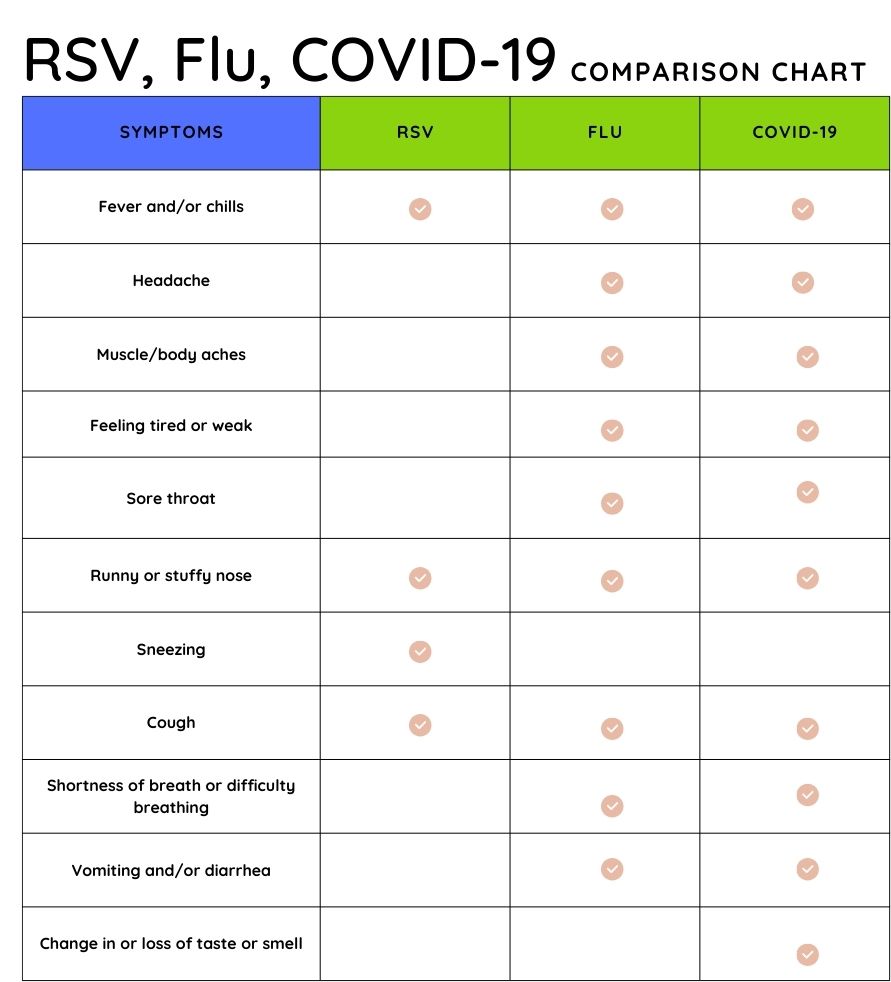RSV, Influenza, and COVID-19 Information
The East Hartford Health Department is encouraging residents to vaccinate themselves against viral respiratory illnesses such as respiratory syncytial virus (RSV), influenza (Flu), and COVID-19. These illnesses are especially common in the fall and winter. It is important to stay up-to-date with vaccinations to keep ourselves and our community healthy. Vaccinations are proven to be safe and effective!
RSV is a respiratory virus that typically presents as cold-like symptoms. Most people recover within 1-2 weeks and experience mild illness. Some RSV cases can be serious, especially in the infant, young children, and older adult populations.
- Vaccination Recommendations: 60 years of age and older, pregnant women (32-36 weeks), infants (if mother did not receive vaccination during pregnancy), and some young children (please confirm eligibility with your primary care provider)
Flu is a respiratory virus that infects the nose, throat, and sometimes lungs. Flu can cause mild to severe illness and even death.
- Vaccination Recommendations: All individuals 6 months of age and older
COVID-19 is a respiratory virus that can feel like a cold, the flu, or pneumonia in severe cases. Most people will have mild symptoms, but some people may become seriously ill from COVID-19. COVID-19 may attack more parts of the body than the lungs and respiratory system.
- Vaccination Recommendations: All individuals 6 months of age and older
Means of Transmission of RSV, Flu, and COVID-19:
- When an infected person breathes out droplets that contain the virus (through talking, coughing, sneezing) and those droplets are breathed in by other people or land on their eyes, nose, or mouth.
- Through touching a surface that has the virus on it (like a doorknob) and then touching your face before washing your hands.
Preventive Measures for RSV, Flu, and COVID-19:
- Stay up-to-date on vaccination (as applicable)
- Avoid close contact with people who are sick
- Stay home when you are sick
- Wash hands often with soap and water for at least 20 seconds! If unable to wash hands, use an alcohol-based hand rub.
- Avoid touching your eyes, nose, and mouth with unwashed hands
- Cover cough and sneezes with a tissue or your sleeve
- Clean and disinfect frequently touched surfaces
- Avoid activities such as kissing, sharing utensils/drinks, or shaking hands with people that are sick
- Maintain healthy habits such as eating a nutritious diet, getting adequate sleep, and exercising regularly

Symptoms of RSV, Flu, and COVID-19 may overlap, but there are some differences to account for. Infants with RSV may experience irritability, decreased activity, and breathing difficulty.
Viral Respiratory Illness Care Recommendations:
- Manage fever and headaches with over-the-counter fever reducers and pain relievers such as acetaminophen or ibuprofen (never give aspirin to children).
- Stay home and rest.
- Drink enough fluids to prevent dehydration.
- Talk to your doctor about additional nonprescription cold medicines and prescription antiviral medicines.
When sick with any respiratory illness (RSV, Flu, COVID), you may return to normal activities when the following are both true…
- Your symptoms have been improving for 24 hrs
- You’ve been fever free for 24 hrs (without the use of fever reducing medications)
When returning to normal activities, please follow added precautions for 5 days to avoid spreading illness to others:
- Frequent hand washing
- Covering coughs and sneezes
- Sanitizing commonly touched surfaces
- Improved ventilation
- Masking
- Physical distancing from others indoors
Where to find vaccines in our community:
- Intercommunity Healthcare
- First Choice Health Centers (no insurance required)
- Malta House of Care Clinic (no insurance required)
- Contact your primary care provider
- Vaccines.gov - Find COVID‑19 vaccine locations near you
Please visit the Centers for Disease Control and Prevention website for the most up-to-date guidance on COVID, Flu, and RSV.
| Attachment | Size |
|---|---|
| 2.18 MB | |
| 2.18 MB | |
| 1.83 MB | |
| 1.82 MB | |
| 1.62 MB | |
| 1.62 MB | |
| 739.97 KB |

